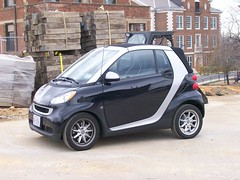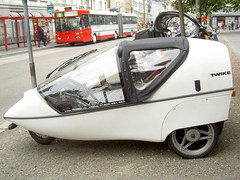Speaking of a city sustainability policy
Many years ago, the Washington Post's advertising campaign for why you should subscribe (I do, I prefer print to digital) was "if you don't get it, you don't get it."
For the most part, I repeat that refrain over and over and over and over and over and over when I think about how the City Council legislates "policy" or does things without having an overarching plan or vision.
Two examples...
1. Bloomingdale (for now) also reported on the groundbreaking ceremony for the St. Martin's Project ("st. martin's apartments groundbreaking ceremony") and included an aside from Councilmember Thomas about Mayor Fenty's choice of vehicle:
in a cheesy comment, [Councilmember Thomas] noted that he had driven from the wilson building in a v8-powered SUV, while mayor fenty had driven over in his smart car. Councilman thomas told mayor fenty that he should abandon the smart car and get back in something with "more horsepower" so he could make it to these events more quickly. all things said, i'd much rather that those driving would all follow the mayor's example instead of barreling around in gas guzzlers like the councilman.

Mayor Fenty's SmartCar. Photo by Imgoph.
This is a classic example of "if you don't get it, you don't get it." I understand why politicians use cars. They have to go to many many meetings sequentially, and it's time efficient for them to use a car. But think about what you do in any case.
Although, maybe the next upgrade for Mayor Fenty, clearly not Councilmember Thomas, would be a Twike, a hybrid bicycle-electric car.

Flickr photo of an "urban" Twike by Ange Halle.
2. Greater Greater Washington writes incessantly (which is necessary) about "performance parking" policies, which focus on right-pricing valuable street parking spaces.
So Councilmember Graham puts in legislation to increase the pricing of these spaces downtown to $2/hour*. I'm not necessarily against this. (Surprisingly, given my anti-car bias, I try to balance that bias with the need to promote Downtown businesses, especially retail, and the fact that parking in the suburbs for the most part is free and DC doesn't have municipal lots that can be used to offer pricing policies that balance revenue generation with developing a supportive business climate.)
But instead of using the additional money to support transportation improvements, Councilmember Graham suggests using the money for social service programs. See "DC Council weighs doubling downtown parking meter rate" from the Examiner.
Why not do the right policy because its the right policy, not just some short-term financial fix?
----------
* Separately the DowntownDC BID is exploring the creation of a master parking wayfinding and signage system to direct people to parking structures--which in DC are privately owned. I would rather see money from increased parking meters used to help implement such a system, and to fund a variety of other transportation improvements, rather than social services, which already get more than $1 billion annually of the DC budget.
See these two "Transportation Issue Briefs" from the DowntownDC BID:
-- Smart Parking in Downtown DC
-- Congestion Management: A Systems Approach
Labels: progressive urban political agenda, sustainable land use and resource planning, transportation planning



0 Comments:
Post a Comment
<< Home